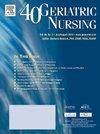Exploring social determinants of healthcare and cognition levels among diverse older adults
IF 2.5
3区 医学
Q3 GERIATRICS & GERONTOLOGY
引用次数: 0
Abstract
Background
The purpose was to investigate the impact of social determinants of health on healthcare utilization among older adults in two cognition groups: normal and dementia/impaired cognition.
Methods
We used cross-sectional data from the Health and Retirement Study (N = 16,339) to assess healthcare utilization: hospital stay, nursing home stay, hospice care, and doctor visits. The respondents were classified into two cognition groups using the Langa-Weir approach.
Results
A cohort comparison between normal (mean age = 66.1) and dementia/impaired cognition (mean age = 71.9) groups revealed dementia/impaired group included more individuals from racial and ethnic minorities (42.7 % Black/Other, 20.8 % Hispanic) compared to the normal cognition (24.7 % Black/Other, 12.1 % Hispanic). They experienced longer hospital, nursing home, and hospice stays and varied doctor visit frequencies. These differences were influenced by race, age, marital status, education, and rurality.
Conclusion
Social determinants of health play an important role in predicting disparities in healthcare utilization among older adults across cognition levels.
探讨不同老年人保健和认知水平的社会决定因素。
背景:目的是研究正常认知组和痴呆/认知受损组老年人健康社会决定因素对医疗保健利用的影响。方法:我们使用来自健康与退休研究的横断面数据(N = 16,339)来评估医疗保健利用:住院、养老院、临终关怀和医生就诊。使用Langa-Weir方法将受访者分为两个认知组。结果:正常组(平均年龄66.1岁)和痴呆/认知障碍组(平均年龄71.9岁)之间的队列比较显示,与正常认知组(24.7%黑人/其他组,12.1%西班牙裔)相比,痴呆/认知障碍组包括更多的少数种族和少数民族个体(42.7%黑人/其他组,20.8%西班牙裔)。他们在医院、疗养院和临终关怀医院待的时间更长,看医生的频率也不同。这些差异受到种族、年龄、婚姻状况、教育程度和农村地区的影响。结论:健康的社会决定因素在预测老年人不同认知水平的医疗保健利用差异中起重要作用。
本文章由计算机程序翻译,如有差异,请以英文原文为准。
求助全文
约1分钟内获得全文
求助全文
来源期刊

Geriatric Nursing
医学-护理
CiteScore
3.80
自引率
7.40%
发文量
257
审稿时长
>12 weeks
期刊介绍:
Geriatric Nursing is a comprehensive source for clinical information and management advice relating to the care of older adults. The journal''s peer-reviewed articles report the latest developments in the management of acute and chronic disorders and provide practical advice on care of older adults across the long term continuum. Geriatric Nursing addresses current issues related to drugs, advance directives, staff development and management, legal issues, client and caregiver education, infection control, and other topics. The journal is written specifically for nurses and nurse practitioners who work with older adults in any care setting.
 求助内容:
求助内容: 应助结果提醒方式:
应助结果提醒方式:


